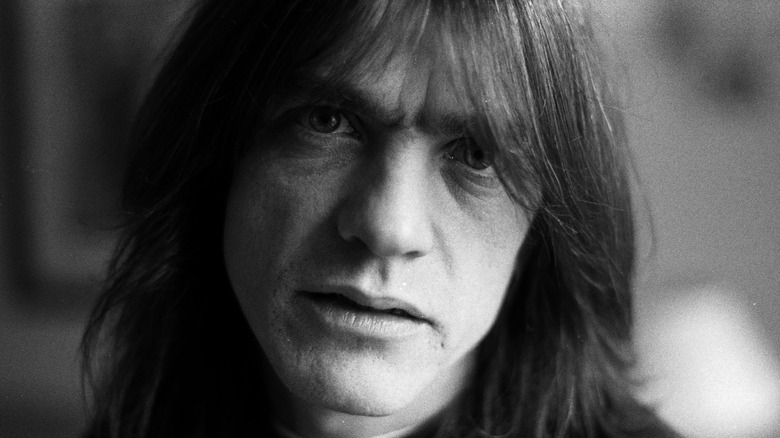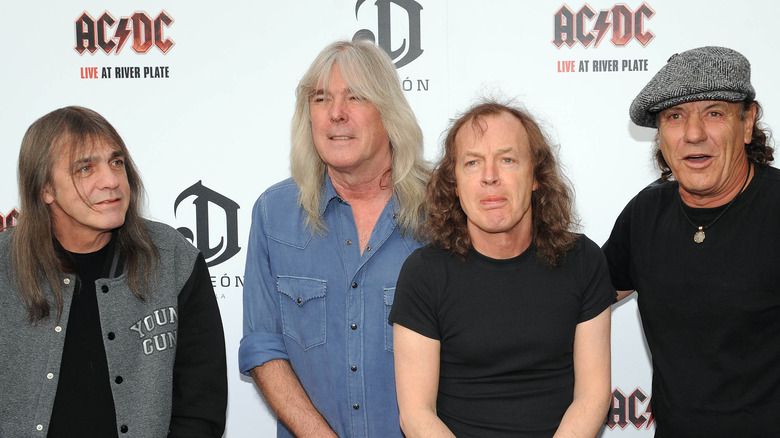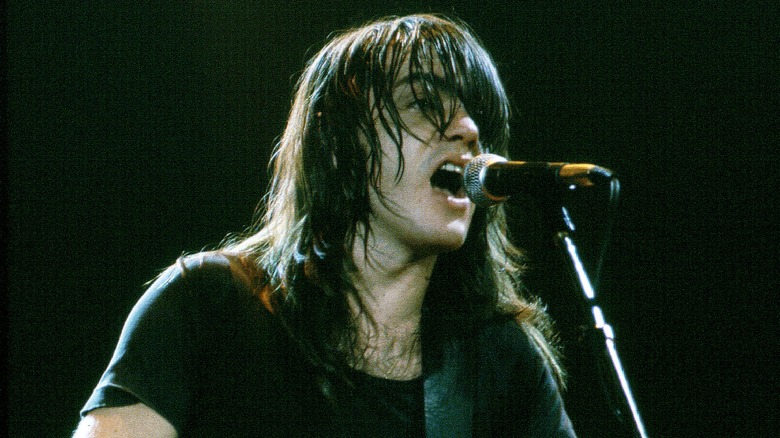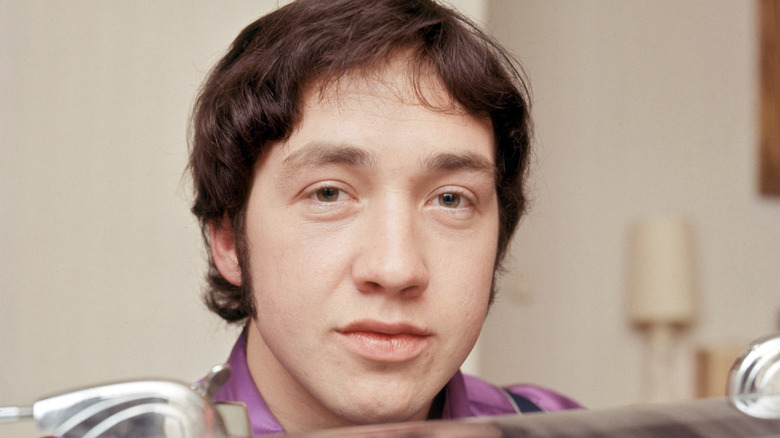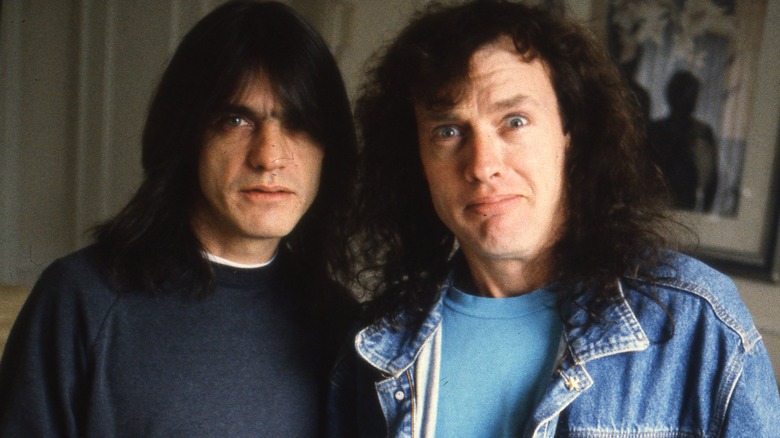What The Last 12 Months Of Malcolm Young's Life Were Like
When talking about AC/DC, one will almost always bring up Angus Young's transcendent skills as a lead guitarist, as well as the schoolboy outfits he'd wear on stage. The late Bon Scott gets a lot of love from fans as the band's lead singer for most of the 1970s, and so does his replacement, Brian Johnson, and his unmistakable screeching delivery on vocals. Few fans, however, realize that their rhythm guitarist, Malcolm Young, was arguably even more important to the Australian rock legends. Johnson had, in fact, described Malcolm as the band's "spiritual leader" in 2014, right around the time Malcolm had to leave AC/DC after being diagnosed with dementia, per Guitar World.
For more than four decades, starting from the time he and Angus formed AC/DC in 1973, Malcolm Young was a fixture of the band, helping provide the rock-solid rhythm that underpinned their greatest hits. He was even credited with convincing the group to stay together following Scott's tragic death in 1980, and it's a good thing they did — with Johnson on board, AC/DC released an instant classic in "Back in Black" and became more popular than ever. When Malcolm died on November 18, 2017, at the age of 64, it looked to be the end of an era, though as NME reported, AC/DC did make an amazing comeback in 2020, with Stevie Young taking his uncle's place on rhythm guitar.
Here's a closer look at the last 12 months of Malcolm Young's extraordinary life.
Malcolm Young was honored at gig for Alzheimer's charity in November 2016
Little more than a year before Malcolm Young's death, the guitarist was honored at a fundraising gig at Los Angeles' iconic Whisky A Go Go. According to Louder, the event was billed as an "Ultimate Jam Night," and while it didn't technically feature any of AC/DC's current members at the time, former drummer Simon Wright was among the many musicians who were scheduled to perform on the night of November 15, 2016. The show's objective was to raise money for the Alzheimer's Association, an organization that hopes to "end Alzheimer's and all other dementia — by accelerating global research, driving risk reduction and early detection, and maximizing quality care and support."
At that point, it had been two years since Malcolm retired from touring due to his dementia, but as Angus Young recalled in 2014, the rhythm guitarist had started showing signs of cognitive decline as far back as 2008, when they were working on their "Black Ice" album. That didn't stop him from pushing forward with the release and touring behind it. "His symptoms of dementia were starting then, and he got through it," Angus told The Guardian. "I had said to him, even before we did the album: 'Are you sure you want to do this? I have to know that you really want to do it.' He was the one who said: 'Yes! We've really got to do it.'"
AC/DC's future was in limbo as Malcolm Young dealt with dementia
It wasn't just Malcolm Young whose future with AC/DC was in question during the final months of 2016. Although Stevie Young was a competent replacement for his uncle as AC/DC's touring rhythm guitarist, Malcolm's retirement was quickly followed by the news that longtime drummer Phil Rudd was facing various criminal charges, including drug possession and attempting to hire a hitman. He was replaced by the band's early-'90s drummer, Chris Slade. Then, vocalist Brian Johnson was advised by doctors that he had to quit touring or risk the possibility of permanent hearing loss; Guns N' Roses frontman Axl Rose took his place for the remainder of the "Rock Or Bust" tour. Finally, at the end of the tour, bassist Cliff Williams announced his plans to retire from music.
As Malcolm quietly battled dementia and brother Angus Young faced the possibility of being AC/DC's last founding member still active, Rudd commented on the issue, saying on the "Rich Davenport Rock Show" (via Loudwire) that it wouldn't be a "good idea" for Angus to discontinue the band. "Angus has never played better [than he did] on the 'Rock Or Bust' album," he added. "He's playing f***ing great. What's he gonna give it up for? That's like f***ing Napoleon not finding somewhere else to f***ing conquer."
Fundraisers for Young continued into the new year
Updates on Malcolm Young's health were few and far in between during the last 12 months of his life, but AC/DC fans remained as dedicated as ever as they supported the band's co-founder during the first few months of 2017. According to NME, a group of Swedish fans launched an event called "Acdcmachine Gathering 2017" in an effort to raise funds for the prevention of Alzheimer's disease, and this caught the attention of Brian Johnson, who was on hiatus from touring due to his own health issues.
"I just want to say, I'm so proud of what you're doing for the Alzheimer dementia research," the lead singer said in a statement. "As you know we have a wounded soldier, Malcolm and I think what you're doing to raise the awareness of everyone about this dreadful disease is just absolutely fabulous."
Johnson went on to stress that Young would "be so proud" of his band's fans. He concluded his statement by thanking them for launching such an initiative and letting them know that he's proud of them for raising awareness about Alzheimer's disease and other forms of dementia.
Malcolm Young's older brother died a month before he did
On October 23, 2017, Angus and Malcolm Young's older brother, George Young (pictured above), died at the age 70. As recalled by Variety, George played an important role for AC/DC in their early years, co-producing the band's first five albums with longtime friend Harry Vanda, but he had a pretty distinguished career of his own as a musician. He and Vanda played for the Easybeats in the 1960s, and while they never reached superstardom outside of their native Australia, they did record an all-time classic in "Friday on My Mind," which reached No. 16 on the Billboard singles charts in 1967.
Neither Malcolm nor Angus Young issued any individual statements following their brother's death, but AC/DC, as a band, took to Twitter to credit George Young for his contributions, writing, "Without his help and guidance there would not have been an AC/DC." In addition to the group's early releases, George also produced their 2000 album "Stiff Upper Lip," temporarily coming out of retirement to help his brothers' band one last time.
Tragic as George's death was for the Young family, it would be followed less than a month later by Malcolm's death, which came after years of various health problems. Per Ultimate Classic Rock, the veteran axeman also dealt with heart problems and lung cancer in the years before his dementia diagnosis.
Malcolm Young had a 'big smile' until the very end
Malcolm Young's death on November 18, 2017, was a sad day for music fans around the world, as well as the many musicians who played alongside AC/DC or were influenced by the band's back-to-basics brand of hard rock. Angus Young was emotional as he looked back on his brother's final days, telling "60 Minutes Australia" in 2020 (posted on YouTube) that the hardest part wasn't saying goodbye to Malcolm but rather watching how dementia took its toll on him during the last years of his life.
Despite his illness, Malcolm did his best to remain positive and always had a "big smile" on his face whenever Angus was around. "And I think that was probably ... for me, that always gave me a kind of joy, even though he was in that state," the lead guitarist continued. "That was always the joy of it." Angus also recalled that Malcolm always enjoyed it whenever he'd drop by and play some riffs on the guitar for him; this underscored the importance of the two brothers spending time with each other during Malcolm's final years. "He would try to tap his foot," Angus said. "But he always knew I was there ... I was with him toward the end."
Meanwhile, frontman Brian Johnson remarked that it was "obvious" how Malcolm's spirit was with them during his funeral, as that was the event that helped convince AC/DC to get back together for what would become their 2020 album, "Power Up."
